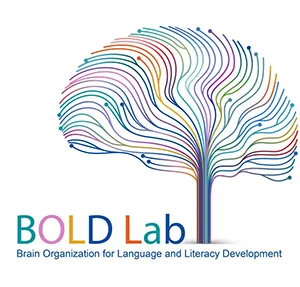Welcome to the Brain Organization for Language and Literacy Development Laboratory

Scientific Director: Dr. Kaja Jasińska
Researchers at the Brain Organization for Language and Literacy Development (BOLD) Lab study how a child’s brain develops to support complex cognitive abilities and learning. Our work broadly aims to understand how, when, and why a child’s environment can influence neurocognitive development, including language, cognitive, and socio-emotional skills, and learning outcomes (literacy, numeracy).
Our research focuses on different childhood experiences, including (1) language experience (bilingualism and multilingualism, learning signed languages or using a cochlear implant), (2) growing up in communities with poverty-related risk factors, and (3) refugee and displaced children. Our work involves communities in Canada and West Africa.
We use neuroimaging technologies (functional Near Infrared Spectroscopy [fNIRS], structural and functional MRI) in combination with the latest behavioral tools of cognitive science to gain new insights into the biological underpinnings of cognition and learning.